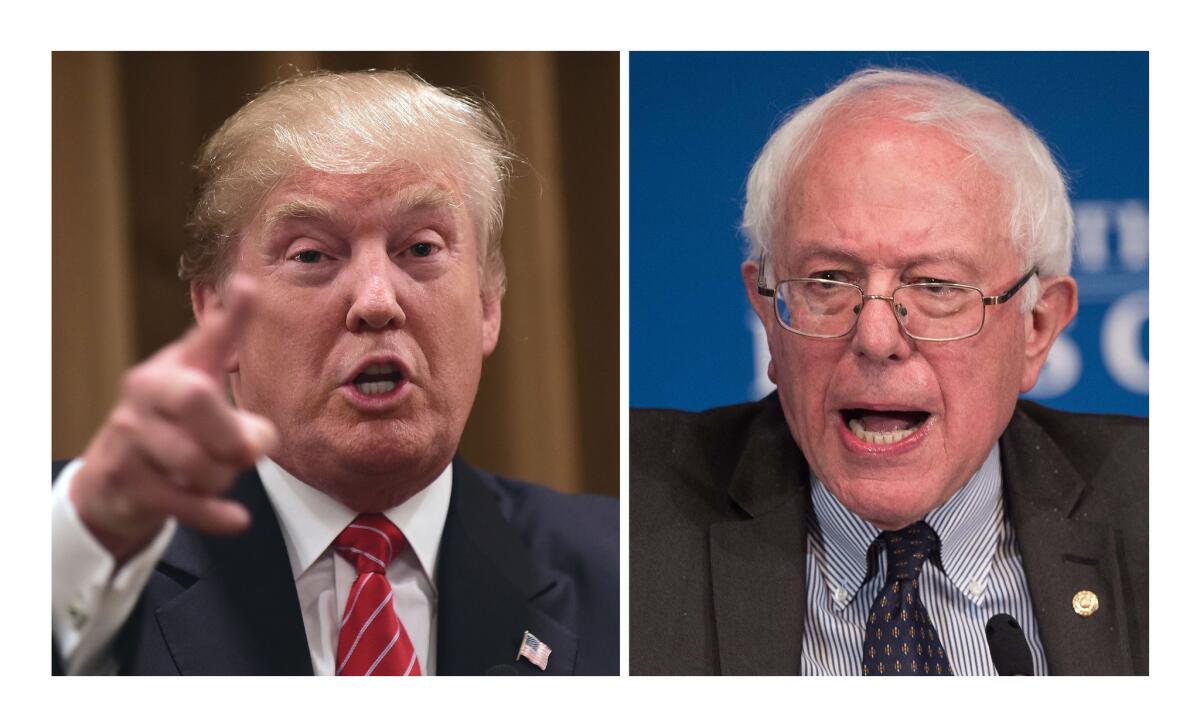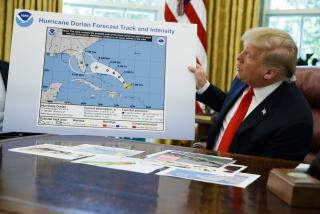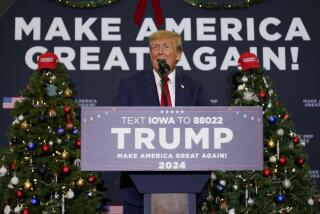Column: Coronavirus has turned Republican politics upside down. Will that last?

- Share via
I’ve been telecommuting for decades, so for me sheltering in place isn’t remotely the burden it is for a lot of Americans. But it does make the job of following politics more difficult for two reasons.
First, to a certain degree, politics are on lockdown too. To the extent the Democratic primaries are in the news, it’s mostly as a public health story, thanks to Wisconsin’s debate over whether to carry on with in-person voting Tuesday (ultimately nixed by Gov. Tony Evers) and questions of how to conduct a convention while social distancing. Bernie Sanders — who is still running, by the way — wants to debate the presumptive nominee Joe Biden again, but very few in the party are interested in that. Biden himself is running a pandemic version of a front porch campaign via teleconference from his home office.
The second reason is more vexing: Nobody has any clue what post-pandemic politics will look like. On the left, some fantasize about somehow replacing Joe Biden with New York Gov. Andrew Cuomo, which makes a lot of sense given his impressive performance of late, except for the near impossibility of actually orchestrating such a handoff. Meanwhile, progressive groups, still licking their wounds over the almost instantaneous marginalization of Bernie Sanders, are suddenly seeing their massive grassroots organizations starved of money and the ability to organize.
The situation on the right is even more opaque. For good or ill, the pandemic has made President Trump an even more central figure in our politics, thanks to the role the White House plays in a national emergency and his nightly, often rambling, news conferences.
That’s not all to the GOP’s advantage. For one thing, Trump’s refusal to admit any error in how he’s handled the crisis has had the unintended effect of starving Republicans of some useful talking points. Mitch McConnell tried to float the idea that the Democrats’ impeachment fixation distracted the president from following through after the travel ban with a more robust response to the pandemic when it would have made a difference, but Trump, himself, threw cold water on that.
Regardless, as the right gears up for either a Trump win or a lame duck presidency amid a hard period of recovery, it’s possible to glean some contours of post-pandemic Republican politics.
Maybe it’s enough just to be a witness to these crazy times.
Trump was always going to be the nominee, but his set of issues has been reshuffled entirely. He was all set to run on a roaring economy, pitting himself against “socialism” — even though his preferred foil, Bernie Sanders, was sidelined on Super Tuesday. Now, the economy has headed south, and our anti-socialist president is ordering businesses to do the government’s bidding and handing out direct cash payments to millions of Americans.
Trump’s vacillation between the need to clamp down on the virus and his desire to open up the economy is somewhat symbolic of the broader divides on the right. Longtime MAGA consigliere Stephen Bannon tells the New York Times that the GOP’s commitment to “limited government” is gone forever. At the same time, others in the Trumpist orbit, like Donald Trump Jr., are still pushing the idea that all the corona hype is overblown and just part of an effort to take down his dad.
Somewhere in the middle, conservative politicians and intellectuals are trying to find a less Trumpcentric path. Long before the coronavirus emerged in Wuhan, China, Sen. Marco Rubio and a coterie of eggheads were firing salvos at “unfettered capitalism” — as if that described the status quo at any point in the last century of American politics — and offering a blueprint for “common good capitalism.” Meanwhile, Nikki Haley, Trump’s former U.N. ambassador (for whom my wife worked), resigned from the board of Boeing last month in protest over their request for a federal bailout. It was a principled stand, but it’s anyone’s guess whether corporate bailouts will be as unpopular on the right as they were before the pandemic.
But if it’s hard to know whether crony capitalism will remain out of favor, you can count on China to stay in the doghouse for years to come.
That’s good news for one politician worth watching: Sen. Tom Cotton of Arkansas. Long a China hawk, Cotton is credited with convincing Trump to implement the China travel ban (though Trump didn’t go as far as Cotton wanted). He deserves credit for spotting the threat and speaking out early on. Widely assumed to have presidential aspirations, Cotton has also deftly managed to avoid being seen as a Trump yes-man — like, say Sen. Lindsey Graham — while remaining a favorite of the president’s.
If the GOP ultimately sours on the president’s handling of the crisis, Cotton would be ideally situated to highlight his prescience. But that’s a long way off yet, and for now it’s worth noting that Cotton is running ads supporting the president’s response to the pandemic.
More to Read
A cure for the common opinion
Get thought-provoking perspectives with our weekly newsletter.
You may occasionally receive promotional content from the Los Angeles Times.












